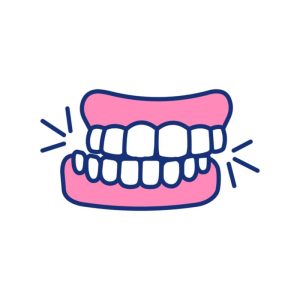How Do I Prevent and Treat Teeth Grinding?
3 Minute Read:
 Teeth grinding (bruxism) is common and everyone grinds their teeth at one time or another. However, serious cases can often lead to worn down or broken teeth and can contribute to temporomandibular disorders (TMD), sometimes called TMJ.
Teeth grinding (bruxism) is common and everyone grinds their teeth at one time or another. However, serious cases can often lead to worn down or broken teeth and can contribute to temporomandibular disorders (TMD), sometimes called TMJ.
If you suspect or have been told that you grind your teeth at night, it’s important not to ignore the issue.
Diagnosing Bruxism
Your dentist is the best resource for learning about teeth grinding and the ways to treat it. While some cases are mild, any form of bruxism is harmful, and your dentist can determine the extent of damage that exists, along with the best way to manage the condition.
During an evaluation for teeth-grinding, expect your dental provider to ask questions about your oral health, sleeping routines, and medications. An exam will be conducted to look for signs of chipped or worn down teeth, tenderness, and jaw or ear pain that may point to TMD.
Causes of Teeth-Grinding
TMD is a major cause of bruxism, as is anxiety and stress. The symptoms and causes of temporomandibular disorders or teeth-grinding overlap and are often connected.
Sleep apnea is another significant cause of bruxism and can cause extreme teeth grinding and jaw clenching. If you have symptoms of this condition, it’s vital you obtain a diagnosis and a comprehensive dentist can help by referring you to a sleep medicine specialist and prescribing a TAP device when appropriate.
Occasionally, a medical health issue, like gastroesophageal reflux disease (GERD), may cause bruxism, in which case, treating the underlying condition should reduce or eliminate any teeth grinding.
Structural issues, such as misalignment of the teeth or jaw, can also trigger bruxism or TMD and are best addressed by your dentist. Dental alignment concerns can be corrected with ClearCorrect™.
Treatment for Bruxism
Younger patients presenting mild cases may not require treatment, as they may outgrow the condition.
However, for people that suffer from chronic teeth grinding, a custom-made nightguard is highly recommended and can prevent the costly damage caused by continued clenching and grinding.
If TMD is to blame for bruxism, this disorder can often be managed with a splint or specially designed mouthguard.
If dental alignment or missing teeth has led to bruxism, your dentist can correct these issues easily and restore any teeth that have been damaged from grinding.
When stress or anxiety is the cause of teeth grinding or TMD, calming techniques can be used, such as yoga, meditation, listening to music, or any practice that helps you reduce stress. However, if you continue to experience these negative emotions, it may be a good idea to talk to a counselor or therapist to deal with the underlying cause of your distress.
In some cases, your doctor may temporarily prescribe medicine to help you relax.
Learn more about teeth grinding in children and when a sleep study might be helpful.
Where to Go for Help With Teeth-Grinding in Chicago, IL
Dr. Benjamin Fiss provides comprehensive dental care in his Chicago office and can help you find relief from bruxism. He will provide a thorough assessment of your condition and discuss your best options.
Dr. Fiss has the skill and experience to evaluate and treat teeth grinding and TMD. He offers custom-made mouthguards and nightguards to address these issues, and if you already have damage from clenching or grinding your teeth, he can restore them with high-quality porcelain veneers or crowns.
If you have problems with teeth grinding and live in the Chicago area, call Dr. Benjamin Fiss today for a fast and effective solution.